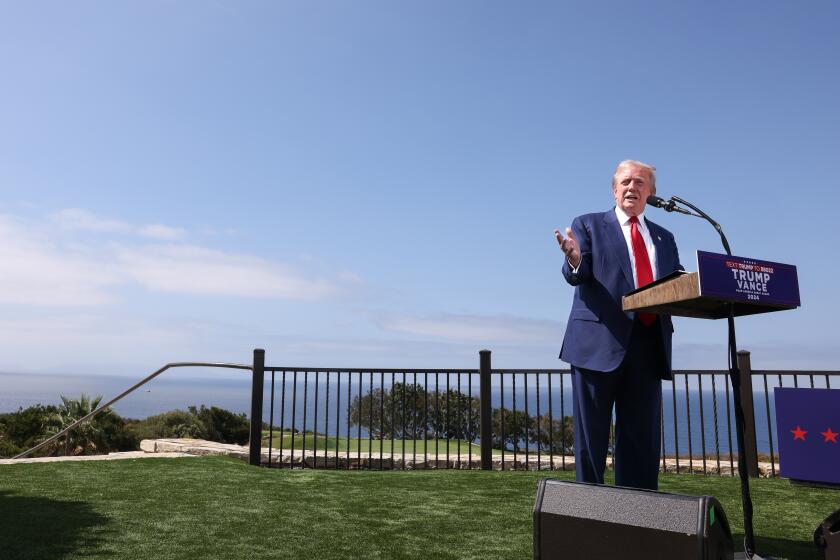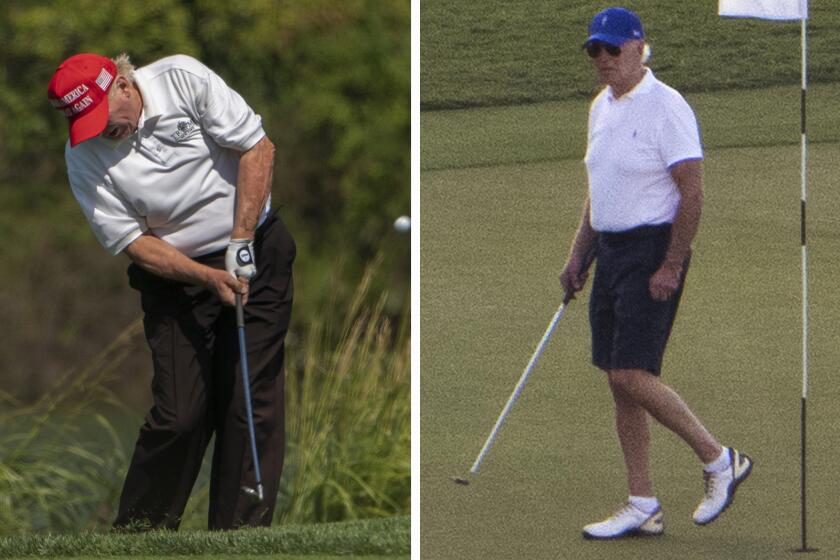Edwards and Dean Try to Slow Kerry
John Edwards and Howard Dean plunged Saturday into a final weekend of campaigning across Wisconsin, hoping to trip up the front-running John F. Kerry and send the Democratic presidential fight into March, when California and other big states have their say.
Edwards insisted he would continue his campaign regardless of the outcome of Tuesday’s primary here. “People want this process to go on,” the North Carolina senator told reporters after a raucous rally in Madison. “They want Democratic primary voters to have a choice.”
Dean -- who had declared Wisconsin a must-win state for him, then changed his mind -- sent mixed signals about his intentions. During an interview with a Chicago-area television station, Dean was vague about what he intended to do if, as polls indicate, he runs far behind Kerry on Tuesday. “You’ll find out on Wednesday,” Dean said.
Kerry kept with his promise to campaign in every state, appearing in Nevada in advance of Saturday’s caucuses -- which he won overwhelmingly -- then flying to Wisconsin to attend the state Democratic Party’s fundraising bash in Milwaukee. Kerry also easily won caucuses in the District of Columbia.
At the Milwaukee gathering, he took a swing at President Bush and his reelection campaign for an Internet ad noting that Kerry, who often attacks special interests, has taken large donations from lobbyists.
“Yesterday, George Bush chose to make his first official campaign message to the American people a negative attack ad sent through the Internet. And if this is the campaign he wants to run, then we’re ready,” the Massachusetts senator said. “We’ll stand our ground ... And we’ll give this country the honest debate that it deserves.”
Edwards also appeared at the event after a quick detour to Los Angeles for a Friday night of fundraising and an appearance on “The Tonight Show with Jay Leno.”
He offered his familiar refrain of an America divided by wealth and class, and vowed that “with the right leadership we will build a country that works for everyone, not the privileged few.”
Dean had an abbreviated Saturday campaign schedule, visiting with African American ministers in Milwaukee, then holding a town hall meeting in Racine before heading home to Burlington, Vt., for his son’s high school hockey game. The trip meant Dean missed the Wisconsin party fundraiser.
“We hope that the voters of Wisconsin respect the governor’s commitment to his family,” said spokesman Jay Carson. “It’s probably not the popular thing to do, but it is the right thing for his family.”
After Wisconsin, the rapid-fire pace of the campaign slows a bit, with just a few small-state contests before March 2. On that day, California, New York, Ohio and seven other states will cast ballots that will allot more than 1,100 delegates to the Democratic National Convention.
Most analysts say anything short of strong showings in Wisconsin will make it difficult for Dean or Edwards to sustain serious campaigns.
Kerry has won 14 of the initial 16 primaries or caucuses. Dean has won none; Edwards has won his native South Carolina, but finished a distant second on Tuesday in Virginia and Tennessee.
That makes Wisconsin pivotal for Dean and Edwards. But the state has drawn close attention for another reason: It has the distinction of hosting the first stand-alone contest since the New Hampshire primary nearly three weeks ago.
Edwards has made job losses the theme of his campaign here, a resonant issue in a state that has shed 80,000 manufacturing positions in the last three years -- the eighth-highest loss, on a percentage basis, in the nation.
Dean has urged Wisconsin voters to strike back at the news media, “which [tell] us the race is over and the Washington insiders have won.”
“On Tuesday,” his TV spots intone, “Wisconsin can be a rubber stamp, or you can vote for real change.”
Kerry, who took two days off at midweek, has spent less time in Wisconsin than his rivals. But his TV ads highlighting his Vietnam War service and sustained coverage of his victories elsewhere have made him a constant presence.
All three of the candidates are to debate today in Milwaukee, along with longshots Rep. Dennis J. Kucinich of Ohio and the Rev. Al Sharpton of New York.
Wisconsin, with its rolling pastures and belching smokestacks, is a state rich in political history. There are legends like Robert LaFollette, a giant of the Progressive era, and rogues like Joseph McCarthy, whose name has entered the popular lexicon as a synonym for demagoguery.
The state has produced such mavericks as former Sen. William Proxmire, a Democrat famed for spotlighting government spending excesses, and Sen. Russell D. Feingold, a Democrat who defied the leaders of both major parties and worked with Republican Sen. John McCain of Arizona to push through landmark campaign finance reform legislation in 2002.
In past presidential campaigns, Wisconsin voters have played a crucial role in shaping Democratic nominating fights, boosting John F. Kennedy over Hubert Humphrey in a key 1960 contest and helping propel the peace candidacy of Sen. Eugene McCarthy of Minnesota in 1968.
In recent years, however, Wisconsin voters have tended to ratify the front-runner who emerged in earlier contests. True to that form, polls last week gave Kerry a commanding lead in the state.
William McAdams, who teaches political science at Milwaukee’s Marquette University, suggested the image of Wisconsin as a hotbed of political iconoclasm was a myth. “There’s not much reason to believe any dynamic going on here is any different from what would be going on in most other states if they had the primary Tuesday,” McAdam said.
That said, Wisconsin’s primary -- open to every citizen at least 18 years of age -- could offer clues for the general election in November.
The state has been hard-fought in several recent presidential campaigns, reflecting its close partisan divide. In 2000, Democrat Al Gore carried Wisconsin over Bush by fewer than 6,000 votes out of more than 2.5 million cast.
There is no party registration in Wisconsin, one of the legacies of LaFollette’s Progressive movement, which sought to diminish the power of party bosses. But analysts generally believe the electorate splits into roughly a third each for Democrats, Republicans and independents.
The divisions are reflected in the state capital in Madison, where Democrat James Doyle serves as governor and Republicans control the two houses of the Legislature.
“The sense of partisanship is about as rough here as it is anywhere in the country,” said Don Kettl, who teaches political science at the University of Wisconsin in Madison.
Jobs and the economy appear uppermost in the minds of Wisconsin voters. The state’s industrial base, a source of high-skill, high-paying jobs, has eroded badly; on Saturday, the Milwaukee Journal Sentinel reported that preliminary figures show Milwaukee County, the state’s largest, losing jobs in 2003 for the fourth year in a row. That is the worse slump since at least 1967.
“The view out there is we’re still in a recession,” said Donald Nichols, a University of Wisconsin economist.
Bush’s standing has suffered as a result. In the latest survey of state voters -- a University of Wisconsin poll completed earlier this month -- 68% percent said he was doing a fair or poor job of dealing with “problems here at home.”
For Democrats, any surprise Tuesday would likely spring from Wisconsin’s unusually open voting system and a high turnout.
The state, among the most civic-minded in the country, has long had one of the highest voter participation rates. Also expected to drive turnout Tuesday are some hot local contests.
Election forecasters have predicted as many as 1.6 million ballots will be cast Tuesday, by far the highest total of the 2004 election season.
Wisconsin has same-day voter registration, the system that helped produce Jesse Ventura’s surprise victory next door in Minnesota’s 1998 governor’s race.
“It’s literally possible for someone to wake up Tuesday morning, get religion ... dig out their electric bill” -- as proof of residence -- “and 10 minutes later go vote in the Democratic primary,” said Kettl.
That raises at least the possibility that Wisconsin could upset the political order one more time.
*
(BEGIN TEXT OF INFOBOX)
Wisconsin profile
Wisconsin’s primary on Tuesday could be a make-or-break test for Democratic presidential candidate Howard Dean. Pinning his hopes on success in the state, Dean has campaigned heavily there but recently reneged on a pledge to drop out of the race if he didn’t win.
Snapshot
*
Population
Statewide: 5.4 million
Urban residents: 68.3%
Residents 65 and older: 13.1%
Median household income: $43,791
Families below poverty line: 5.6%
Families with preschool children below poverty line: 12.2%
*
Ethnicity
White: 87.3%
Black: 5.7%
Latino: 3.6%
Asian: 1.7%
Other: 1.7%
*
Politics
2000 presidential election voters: 2,958,607
Turnout: 66.1%
*
Occupation
Management/ professional: 31.3%
Sales/office: 25.2%
Production/ transportation of goods: 19.8%
Service: 14%
Construction : 8.7%
Farming, fishing and forestry: 0.9%
*
Top exports: Engines and parts, medical machinery, passenger vehicles
*
Sources: U.S. Census Bureau, www.fec.gov
Researched by Times staff researcher Susannah Rosenblatt
*
(BEGIN TEXT OF INFOBOX)
Delegate count
Here is the breakdown of presidential preferences of delegates to the Democratic National Convention. It includes choices by “superdelegates,” those not picked through primaries or caucuses and who can change their minds.
Needed to nominate: 2,16
John F. Kerry: 577
Howard Dean: 188
John Edwards: 166
Al Sharpton: 16
Dennis J. Kucinich: 2
Source: Associated Press
*
Times staff writers Nick Anderson and Matea Gold contributed to this report.
More to Read
Get the L.A. Times Politics newsletter
Deeply reported insights into legislation, politics and policy from Sacramento, Washington and beyond. In your inbox three times per week.
You may occasionally receive promotional content from the Los Angeles Times.











